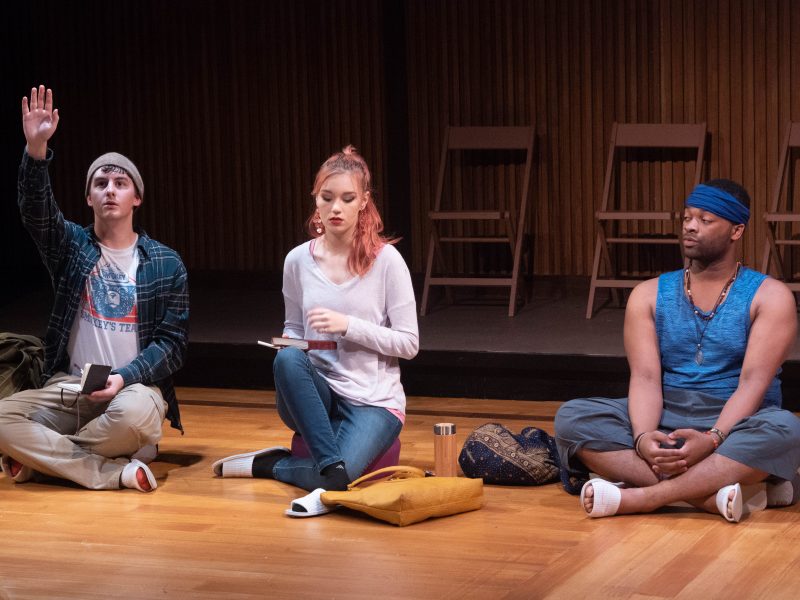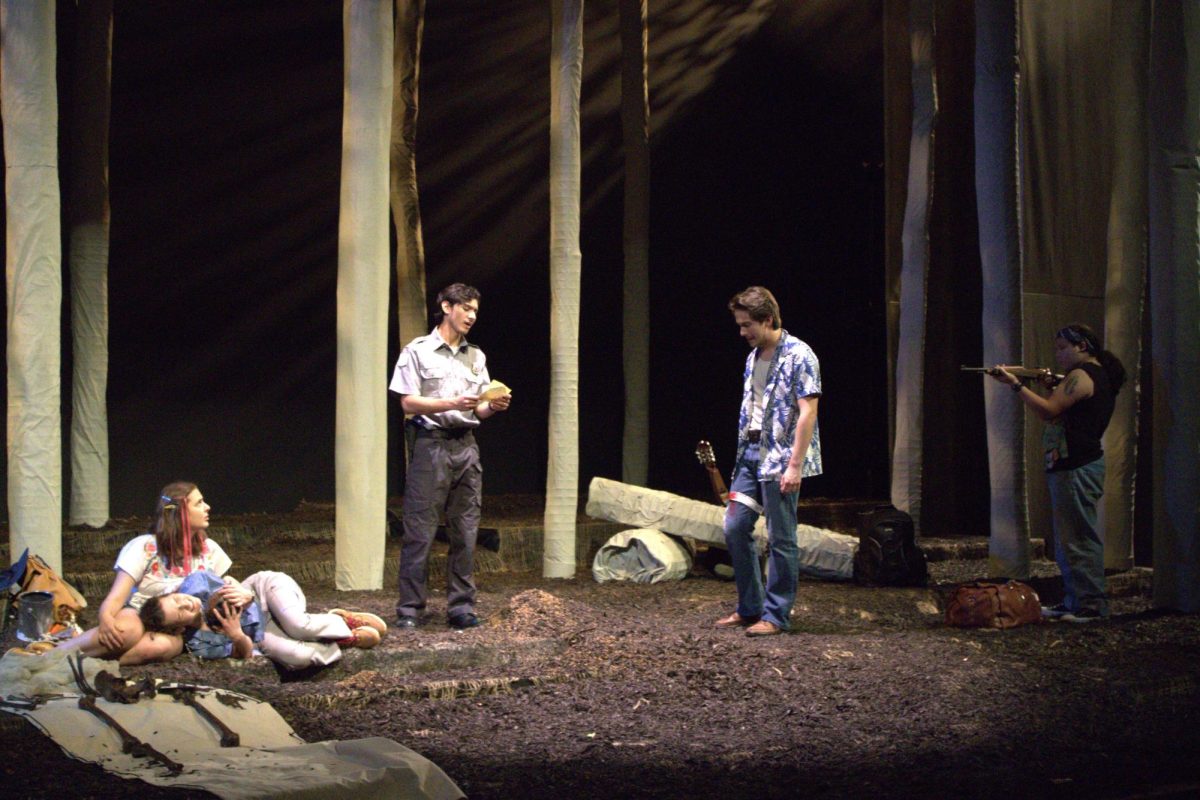From the first moment the audience enters the theatre, “Small Mouth Sounds,” written by Bess Wohl and directed by Kyle Gillette, presents them with a bearded man wearing an old-timey plaid shirt and sitting in silence. Before the play even begins, it challenges the audience’s perception of how a play should operate and continues to do so throughout its course.
In my previous feature on “Small Mouth Sounds,” I noted Gillette’s emphasis on the immersion of the audience into the reality of the play. The audience is brought into the action, or rather, inaction, of the play by virtue of the actors’ silence, allowing the audience to witness the retreaters’ vows of silence clashing harder and harder against their deep desire to connect. The audience is supposed to be quiet already, but now the actors are joining in on this silence, though not without resistance.
The audience naturally comes in knowing nothing about any of these characters and thus spends a lot more time contextualizing each retreaters’ personality based on their movements, actions and idiosyncrasies.
We’re given much to work with in this play, from the way Jan, an old Finnish man played by senior Kody Nace, looks around, wide-eyed while he walks to the way Ned, an unlucky outdoor enthusiast played by junior Alex Bradley, and Joan, a therapist with a lot of pent-up emotions played by senior Marin Sandoz, both close their eyes as the teacher, voiced by junior Anna Wallack, narrates a frog being led, eyes-shut, into an ocean by another frog.
There’s also the way in which Judy, Joan’s partner and a writer played by senior Julia Palmer, motions Ned from across the row of chairs to pass a tissue for Joan, but Alicia, a former child actor played by sophomore Addie Coldiron, takes and uses it, assuming that Ned recognized that she was crying. (Coldiron is a copy editor for the Trinitonian.) Or how Rodney, a yoga instructor played by senior Evan Merriwether, mishears Joan’s and Judy’s footsteps as an approaching bear, despite being the only one not unnerved by the teacher’s warnings of wild animals.
Despite all of these details, which lead the narrative through more and more miscommunication and existential panic on the part of the retreaters, there remains a considerable amount of unanswered questions for the audience, and the play makes it very clear we are not supposed to answer them.
Characters begin crying very suddenly, they pass notes and write intentions onto pieces of paper that the audience cannot see, Ned forgets the question he wanted to ask after explaining his whole story. Most noticeably, the play withholds the backstories of everybody else.
And this obfuscation is very deliberate on the part of the author was well. As Wohl states before the official character descriptions, the audience should be left in the dark as to the deeper assumptions about the interior of the characters.
At the end of the day, each character came to the retreat with very serious personal issues and left the retreat with a sense of resolution. Part of this resolution might come from an increased awareness of their own interior, and part of it might come from the teacher’s brief breakdown where they explain how no one who goes on their retreats ever actually changes.
Whether they were driven by guilt or not, each retreatant was able to arrive at a personal closure because of the ways this retreat had required they confront their problems — though with varying levels of effectiveness — rather than avoid them.
When Ned is describing the eschatological anxiety that accompanies investing your faith into the rapidly destabilizing ecology of the earth, he states that his intention for this retreat is just to breathe. But then he identifies a lasting guilt in that intention because he feels that after everything that has happened to him, he still deserves to be held accountable for saving the earth.
The statement that the teacher offers in a roundabout response to that is not an optimistic statement. Neither the characters nor the audience wants to hear that “we are not alone on this sinking ship.” But at the same time, that’s exactly what each retreatant needed to hear because it describes exactly how the retreat went as a whole.
The reason this ending feels noticeably ambiguous is a result of the structure of the play itself as well as a consequence of the silence: even if we are a part of the silence, this retreat was not ours to experience, and that’s okay. We were able to witness six characters encounter their own oceans in their own ways, and none of them dropped dead, so that’s probably a good start.
“Small Mouth Sounds” opened on Sept. 28 and will continue to play Oct. 3 through Oct. 6.












